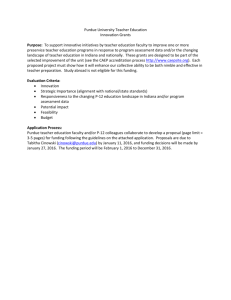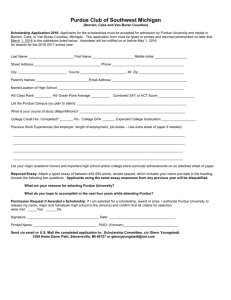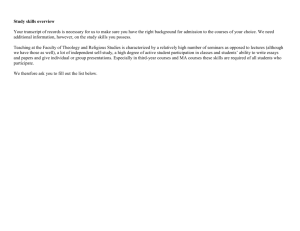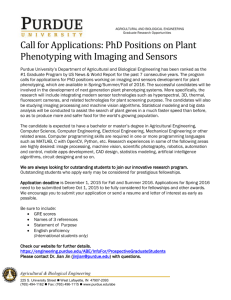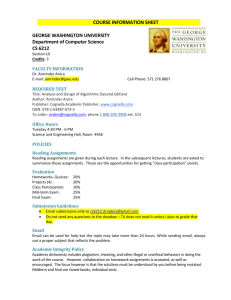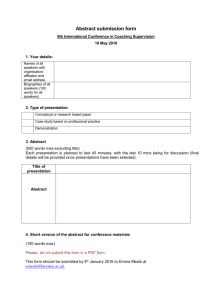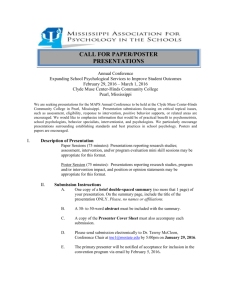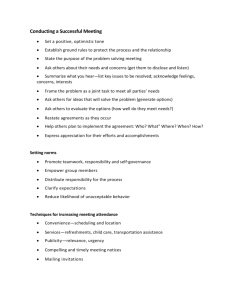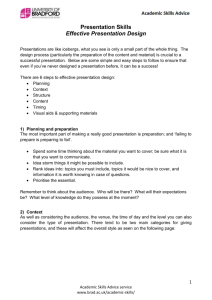Anthropology 592 Syllabus
advertisement
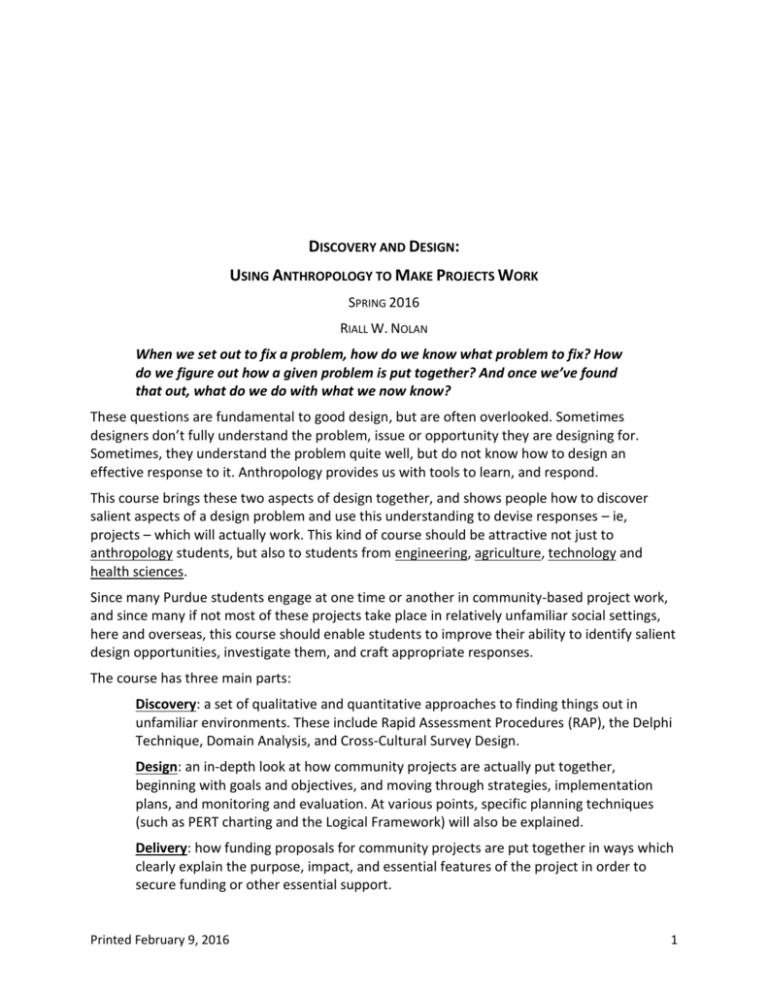
DISCOVERY AND DESIGN: USING ANTHROPOLOGY TO MAKE PROJECTS WORK SPRING 2016 RIALL W. NOLAN When we set out to fix a problem, how do we know what problem to fix? How do we figure out how a given problem is put together? And once we’ve found that out, what do we do with what we now know? These questions are fundamental to good design, but are often overlooked. Sometimes designers don’t fully understand the problem, issue or opportunity they are designing for. Sometimes, they understand the problem quite well, but do not know how to design an effective response to it. Anthropology provides us with tools to learn, and respond. This course brings these two aspects of design together, and shows people how to discover salient aspects of a design problem and use this understanding to devise responses – ie, projects – which will actually work. This kind of course should be attractive not just to anthropology students, but also to students from engineering, agriculture, technology and health sciences. Since many Purdue students engage at one time or another in community-based project work, and since many if not most of these projects take place in relatively unfamiliar social settings, here and overseas, this course should enable students to improve their ability to identify salient design opportunities, investigate them, and craft appropriate responses. The course has three main parts: Discovery: a set of qualitative and quantitative approaches to finding things out in unfamiliar environments. These include Rapid Assessment Procedures (RAP), the Delphi Technique, Domain Analysis, and Cross-Cultural Survey Design. Design: an in-depth look at how community projects are actually put together, beginning with goals and objectives, and moving through strategies, implementation plans, and monitoring and evaluation. At various points, specific planning techniques (such as PERT charting and the Logical Framework) will also be explained. Delivery: how funding proposals for community projects are put together in ways which clearly explain the purpose, impact, and essential features of the project in order to secure funding or other essential support. Printed February 9, 2016 1 COURSE SCHEDULE: Introduction: Weeks 1 and 2 Here we will introduce the course and its aims. We will form design teams, outline working arrangements, and begin to look at design problems to focus on. We will also review the design process, and learn more details about where, how and why social research fits into this process. Finally, we’ll outline the structure of a funding proposal, and review the steps necessary to put one together. Discovery Methods: Weeks 3 – 6 In this section, we’ll go over the fundamentals of social research, and examine a representative set of techniques that designers use. We will look at qualitative methods, primarily interviewing and observation. We will look at quantitative methods, primarily survey and questionnaire design. We will also look at a mixed-methods approach called Rapid Assessment, as well as another qualitative technique called Delphi. Design groups will be asked to develop a set of qualitative and quantitative approaches to their respective design problems. Project Design: Weeks 7 – 11 Here, design groups will put the various pieces of their respective projects together. In this process, the research methods will form an essential part of the design process, in terms of providing the information needed for each step. Proposals: Weeks 12 – 16 Finally, groups will write up their project designs into proposals for funding. They will present these to a panel of judges, get feedback, and incorporate this into a final revision. TEXTBOOKS: There are two required textbooks for this course: Pelto, Pertti , Applied Ethnography: Guidelines for Field Research Nolan, Projects That Work (revised version) We will also be making extensive use of Blackboard and library materials to supplement the two main texts. EXPECTATIONS: The course is highly participative and interactive. I’ll expect you to keep up with the reading, to think about what you’ve read, and to talk about it in class with me and with other students. Attendance is a requirement, and I’ll expect your assignments to be handed in on time. Attendance at class sessions is required, unless I excuse you in advance. This will be a fairly demanding course. You are not only expected to read and absorb written material, but to contribute actively to class discussions with me and with each other. I will expect you to come to class with the reading and the assignments done. We will do a lot of discussing in class, and a large part of your grade will be based on this. And although all of Printed February 9, 2016 2 you are expected to talk, I also expect you to think before you talk. After our design teams are formed, there will be occasions on which teams will need to meet and/or discuss matters outside of class time. We will need to set up a mechanism for doing this effectively, and each of you will be expected to participate. ASSIGNMENTS AND GRADING: Grading will be based on participation, class presentations, and the final proposal. Participation: Twenty-five percent of your final grade will be based on the extent and quality of your class participation. This component includes attendance and reading: if you don’t attend, or if you don’t read the material, you won’t be able to contribute. Presentations: Students will do several group class presentations. Twenty-five percent of your final grade will be based on these. Project Design: Fifty percent your final grade will be based on your team project. 25% of the Final Grade Grade A B Attendance attends all class sessions attends all class sessions Reading does all required reading does all required reading Class Participation class participation makes a major contribution to the class and the aims of the course class participation is lively, informed and helpful to the aims of the course 25% Class Presentations presentations are thoughtprovoking and highly original; could be delivered before a professional audience presentations are polished and professional, and contains original ideas and approaches 50% Project Design Design is thoughtprovoking and highly original; could be submitted for funding. this grade is reserved for truly excellent performance Design is polished and professional and contains original ideas and approaches this grade reflects superior performance C attends all class sessions does all required reading participates fully in class discussions are of acceptable quality - no major mistakes Design is of acceptable quality - no major mistakes D does not attend all class sessions does not do all the reading does not always participate in class discussions the presentations could have been improved in some important ways The design could have been improved in some important ways Printed February 9, 2016 Comments this grade reflects adequate (i.e., good) performance which fully satisfies the course requirements this grade indicates performance which is less than adequate in certain respects 3 In situations where final grades are “borderline” (between a C and D, for example, or between an A and an A-) I will take class participation into account. Class participation doesn’t just mean raising your hand and talking; it means making sense when you do that. So it’s not just the fact of your speaking up in class, it’s the quality that you bring to the discussion. Not talking is your choice, but it may count against you. A FEW SIMPLE GROUND RULES FOR CLASSROOM PROTOCOL: I will expect you to give your undivided attention to what goes on in my classroom. If you are here, then be here. This means no cell phones, no laptops, no newspapers, no iPods – nothing at all that takes your attention away from the class. You can bring them in, but they must be turned off and put away, off your desk. You’re not allowed to text, check email, or use any electronic device while in class. I do not allow weapons of any kind in my classroom. If you’re unsure about what the word “weapon” means, see me. If you’d like to discuss your views on the Second Amendment with me, I’m happy to oblige. See me after class. No loud eating. I don’t particularly care for food in my classroom, but I understand your need for nutrition. Keep your eating and drinking quiet, and clean up after yourself. Come to my class sober and alert. If I see you sleeping or nodding off, I will send you home. Finally, take your hats off in my class, please. I’m just old-fashioned in that respect. It’s not really an obstacle to your learning, more an obstacle to my teaching. Humor me if you will. LATE SUBMISSION/MAKE-UP/EXTRA CREDIT WORK I do not accept late assignments. Things are due when I say they are due. I don’t allow people to make up work or tests they’ve missed, or to do things for extra credit. OFFICE HOURS/MEETINGS I am happy to meet with you at any mutually convenient time. The easiest way to set this up is to email me and tell me when you’re free. You’ll generally get a response right away. SEXUAL HARASSMENT US Federal law and Purdue campus policy protect you from sexual harassment. If you feel that you are or have been the victim of sexual harassment, please contact me, another faculty member, or the Human Resources Office. ACADEMIC AND PROFESSIONAL INTEGRITY The work you turn in for this course should be original – i.e., your own. Any material that you borrow from other sources should be acknowledged in the appropriate way, using standard academic formats. Plagiarism is a serious academic and professional matter, and if you do this, you will receive a failing grade for the course. If you have any questions whatsoever about what constitutes plagiarism, please see me. Printed February 9, 2016 4 OBSTACLES TO LEARNING Anyone having any condition interfering with their learning and participation should bring this to my attention. This includes such things as difficulty with sight or hearing, dyslexia, difficulty with understanding, speaking or reading English, allergies, medical conditions, or any other factor -- physical, mental or situational -- which affects your performance in this course. Knowing this will help me help you. If you have a disability that requires special academic accommodation, let me know during the first week of class, and also notify the Disability Resource Center. It is your responsibility to do this. ABOUT ME I’m a social anthropologist and a specialist in development planning. I have a BA in Psychology from Colgate University, and a Ph.D. in Social Anthropology from the University of Sussex in England. I did my doctoral dissertation on social and economic change among the Bassari people of Eastern Senegal, where I lived for three years. I’ve worked for the World Bank, USAID, and several national governments, in addition to a variety of US consulting firms and NGOs. I’ve lived overseas for nearly twenty years, in mainly in Senegal, Papua New Guinea, Tunisia and Sri Lanka. In these countries I helped design and manage a variety of development projects in areas such as housing, community development, urban development, agriculture, livestock and water supply. I’ve also done short-term assignments in areas such as training, needs assessment, and project evaluation, in Asia, Africa and the former Soviet Union. I speak French, Melanesian Pidgin, and two Senegalese languages. I’ve taught and/or done research at several universities and colleges, including the University of Papua New Guinea, the University of California at Berkeley, Georgia State University, the School for International Training, the University of Pittsburgh, the University of Cincinnati, and the Universities of Sussex and Cambridge in the UK. I’ve written a book and a series of articles on the Bassari, and have also written books and articles on other topics, such as international development work, cross-cultural adjustment, and careers for non-academic anthropologists. I have written several other books on nonacademic subjects. Until recently, I was Purdue’s Dean of International Programs, and I still am active in the international education field. I’m married to Christine Nolan, who used to work for Purdue as a regional development planner. We have one son, William, who is a software designer and lives in San Francisco. I like to travel, hike, write, and build furniture. QUESTIONS? If you have questions or concerns at any time, please call me at 496-2014, email me at rwnolan@purdue.edu, or take your chances and stop by the office at 219B Stone. If I’m there and I’m free, I’ll see you. If I’m not there, you can make an appointment to see me, either with the departmental secretary, or by email to me. Printed February 9, 2016 5
